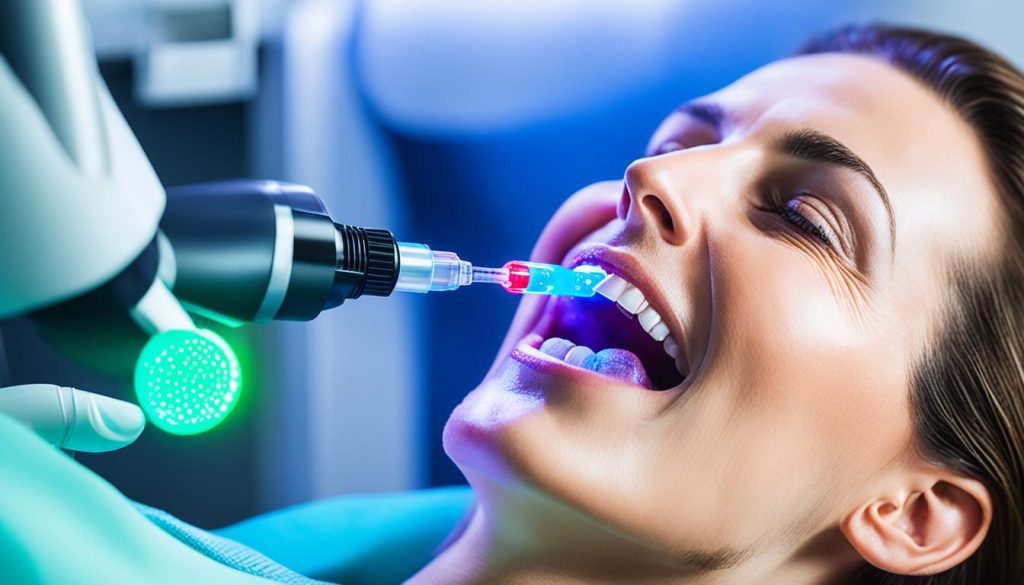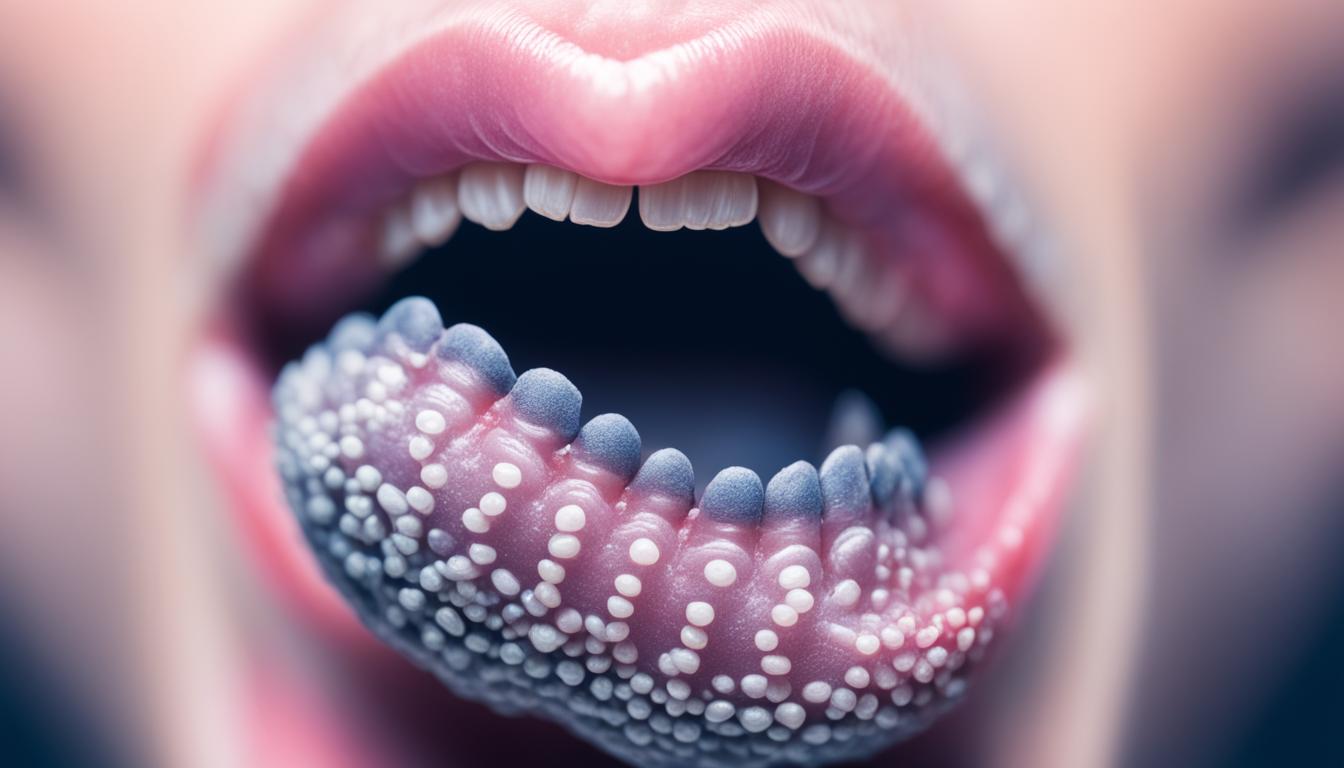Black hairy tongue (BHT) is a common but harmless condition that changes how the tongue looks. The top of the tongue gets covered with long, thin bumps, making it resemble a carpet. People with BHT often don’t feel any discomfort, but they might not like how it makes their tongue look.
The number of people having black hairy tongue disease varies worldwide, from 0.6% to 11.3%. Factors like smoking, drinking a lot of coffee or black tea, not keeping the mouth clean, and certain medicines can lead to this condition.
Key Takeaways:
- Black hairy tongue is a benign condition characterized by elongated filiform lingual papillae on the tongue’s surface.
- Predisposing factors for black hairy tongue include smoking, excessive coffee or black tea consumption, poor oral hygiene, and certain medications.
- BHT is typically asymptomatic but can cause aesthetic concerns.
- Diagnosis is based on visual observation and patient history, ruling out other possible conditions.
- Treatment involves identifying and discontinuing causative factors and maintaining proper oral hygiene.
What Causes Black Hairy Tongue?
Black hairy tongue is a safe condition. It happens when bacteria or fungi build up on the tongue’s surface. These factors cause it:
- Bacterial or fungal overgrowth in the mouth
- Increased keratin production
- Decreased desquamation of surface epithelial cells
- Poor oral hygiene
- Dry mouth
- Excessive use of certain mouthwashes
- Smoking
- Consumption of coffee or black tea
- Certain medications
This leads to longer filiform papillae on the tongue, which look like black or discolored hairs.
It’s key to understand each cause of black hairy tongue:
- Bacterial or fungal overgrowth: An imbalance in the mouth’s microbes can cause some bacteria or fungi to grow too much. This leads to biofilms and debris on the tongue.
- Increased keratin production: Keratin is also on the tongue’s papillae. An abnormal increase in keratin makes the papillae longer.
- Decreased desquamation of surface epithelial cells: Normally, old cells shed to make room for new ones. But in black hairy tongue, shedding is less, causing dead cells to build up.
- Poor oral hygiene: Not brushing well or cleaning the tongue lets bacteria and debris gather. This can cause black hairy tongue.
- Dry mouth: Saliva keeps the mouth healthy. Less saliva production can lead to more bacteria and debris on the tongue.
- Excessive use of certain mouthwashes: Some mouthwashes can irritate the tongue. This disrupts balance and may cause black hairy tongue.
- Smoking: Smoking damages the mouth. It stops normal cell shedding on the tongue and lets debris build up.
- Consumption of coffee or black tea: These drinks have compounds that can stain the tongue, adding to black hairy tongue.
- Certain medications: Some drugs can change the mouth’s normal balance or affect cell shedding, leading to black hairy tongue.
Knowing the causes helps prevent and manage black hairy tongue. Good oral habits can lessen the risk and severity of this condition.
Symptoms of Black Hairy Tongue
Black hairy tongue happens when the tongue turns different colors like black, brown, or even yellow. But most people don’t have other bad symptoms. It’s true that this condition can feel different for everyone.
Some may notice symptoms from having a black hairy tongue. These can include:
- A tickling feeling at the top of the mouth
- A bad taste that stays in the mouth
- Taste changing and not being the same
- A throat that feels too tight
- Having bad breath
But it’s not common, sometimes the hair on the tongue grows too much. This can make someone feel sick or have a burning feeling.
Understanding the Discoloration
The color change in the tongue happens because the tiny bumps on it grow longer and catch bacteria. These bumps, called filiform papillae, look like hair when they get this way.
But seeing this color doesn’t mean you have a big health problem. Black hairy tongue is mostly harmless and goes away if you keep your mouth clean and make healthy life choices.
Subtle Impact on Daily Life
Even though it’s not serious, having symptoms of black hairy tongue can be worrying. It might make you feel less confident. If you see your tongue changing color or feel these symptoms, talking to a doctor or dentist is a good idea. They can help you figure out what to do next.
Diagnosis of Black Hairy Tongue
Doctors diagnose black hairy tongue by looking at it closely. They focus on the tongue’s unique carpet-like texture. The tongue may turn black, brown, green, or yellow.
Doctors also check for other problems that look similar. They look at oral infections, color changes in the tongue, and any lesions.
Tests like looking at samples under a microscope are not common. But, they might be done if the doctor sees something unusual. This helps identify infections or other conditions.
A detailed patient history is crucial, too. Telling your doctor about your oral care, medicines you take, and if you smoke can help. This information gives clues about what caused the condition.
Frequently Asked Questions
- Can black hairy tongue be mistaken for other oral conditions?
- Are there any specific tests for diagnosing black hairy tongue?
- What information should I provide to my healthcare professional for an accurate diagnosis?
Yes, it can look like some oral issues. This is why seeing a doctor for a right diagnosis is key.
Mostly, doctors diagnose it by looking and knowing your health history. Sometimes, more tests are done to check further.
Share details about how you take care of your mouth, your medicines, if you smoke, and other risk factors. This helps a lot.
Conditions That Can Mimic Black Hairy Tongue
| Condition | Symptoms | Distinguishing Features |
|---|---|---|
| Oral candidiasis (oral thrush) | White patches in the mouth, soreness, difficulty eating or swallowing | White patches that can be scraped off, underlying redness |
| Pigmentation changes | Discolored patches on the tongue | Localized discoloration without elongated filiform papillae |
| Tongue lesions | Ulcers, sores, or abnormal growths on the tongue | Distinct presence of sores or growths |
Treatment of Black Hairy Tongue
The best way to treat black hairy tongue is through good oral hygiene. You should brush your teeth and tongue gently and regularly. Use a tongue scraper or a soft toothbrush to get rid of bacteria, debris, and dead cells.
Brushing your teeth and tongue well can prevent black hairy tongue. Make sure to brush at least twice a day. Focus especially on the back of your tongue where most bacteria gather.
A tongue scraper or soft toothbrush can help keep your tongue clean. Gently brush or scrape from back to front. Rinse your tool after each use to keep it clean.
To better avoid black hairy tongue, stay away from things that make it worse. Try to smoke less and cut down on coffee or black tea. Using harsh mouthwashes can also harm your tongue, so pick something gentle and without alcohol.
If these methods don’t help, you might need to see a doctor. In some rare cases, they might give you antibiotics or antifungal medications. These can treat any infections causing the black hairy tongue.
Preventive Tips for Black Hairy Tongue
To stop black hairy tongue from starting, keep up with oral hygiene by following these guidelines:
- Brush your teeth and tongue regularly, at least twice a day.
- Use a tongue scraper or a soft toothbrush to clean the tongue’s surface gently.
- Avoid smoking and excessive consumption of coffee or black tea.
- Choose mouthwashes or rinses that are gentle and alcohol-free.
- Stay hydrated and avoid a dry mouth, as saliva helps remove dead cells from the tongue.
- Visit your dentist regularly for routine check-ups and professional cleanings.
| Treatment Method | Explanation |
|---|---|
| Good oral hygiene practices | Regular brushing of teeth and gentle cleaning of the tongue’s surface. |
| Tongue scraper or soft toothbrush | Use to remove accumulated bacteria, debris, and dead cells from the tongue’s surface. |
| Avoiding contributing factors | Stop smoking, reduce coffee or black tea consumption, and avoid irritating mouthwashes. |
| Medication | In rare cases where the condition persists, a healthcare professional may prescribe antibiotics or antifungal medications. |
By sticking to these preventive tips and keeping good oral hygiene, you can lessen the chance of getting black hairy tongue. This will help keep your tongue looking healthy.

Conclusion
Black hairy tongue is a condition where bacteria or fungi build up on the tongue. This buildup makes the tongue’s surface look dark and hairy. To keep this from happening, it’s key to take care of your oral health.
Good habits can prevent or help fix a black hairy tongue. This means stopping things that cause it and keeping your mouth clean. Cleaning your mouth well can make your tongue look better and cut down on symptoms.
Stem cell therapy is not really used for this condition. But, keeping your mouth clean can make a big difference. Brushing your teeth and tongue well, and maybe using a tongue scraper, helps. You should also avoid smoking, drinking too much black tea or coffee, and harsh mouthwashes.
Seeing a doctor is important if the problem doesn’t go away with good oral hygiene. They can check for other issues and give the right treatment. Also, going to the dentist regularly and following their advice is crucial for fixing a black hairy tongue.

